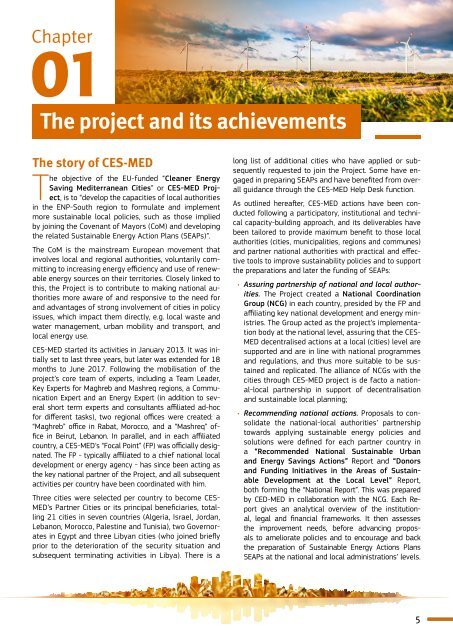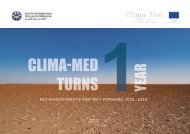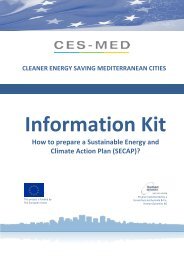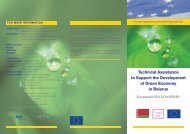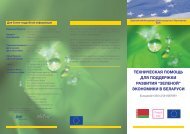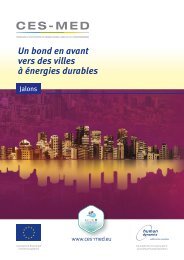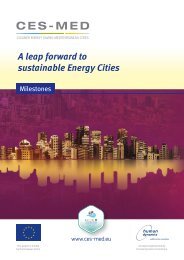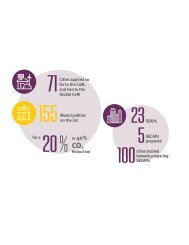CES-MED Milestones EN_WEB_rev July 2017
You also want an ePaper? Increase the reach of your titles
YUMPU automatically turns print PDFs into web optimized ePapers that Google loves.
Chapter<br />
01<br />
The project and its achievements<br />
The story of <strong>CES</strong>-<strong>MED</strong><br />
The objective of the EU-funded “Cleaner Energy<br />
Saving Mediterranean Cities” or <strong>CES</strong>-<strong>MED</strong> Project,<br />
is to “develop the capacities of local authorities<br />
in the <strong>EN</strong>P-South region to formulate and implement<br />
more sustainable local policies, such as those implied<br />
by joining the Covenant of Mayors (CoM) and developing<br />
the related Sustainable Energy Action Plans (SEAPs)”.<br />
The CoM is the mainstream European movement that<br />
involves local and regional authorities, voluntarily committing<br />
to increasing energy efficiency and use of renewable<br />
energy sources on their territories. Closely linked to<br />
this, the Project is to contribute to making national authorities<br />
more aware of and responsive to the need for<br />
and advantages of strong involvement of cities in policy<br />
issues, which impact them directly, e.g. local waste and<br />
water management, urban mobility and transport, and<br />
local energy use.<br />
<strong>CES</strong>-<strong>MED</strong> started its activities in January 2013. It was initially<br />
set to last three years, but later was extended for 18<br />
months to June <strong>2017</strong>. Following the mobilisation of the<br />
project’s core team of experts, including a Team Leader,<br />
Key Experts for Maghreb and Mashreq regions, a Communication<br />
Expert and an Energy Expert (in addition to several<br />
short term experts and consultants affiliated ad-hoc<br />
for different tasks), two regional offices were created: a<br />
“Maghreb” office in Rabat, Morocco, and a “Mashreq” office<br />
in Beirut, Lebanon. In parallel, and in each affiliated<br />
country, a <strong>CES</strong>-<strong>MED</strong>’s “Focal Point” (FP) was officially designated.<br />
The FP - typically affiliated to a chief national local<br />
development or energy agency - has since been acting as<br />
the key national partner of the Project, and all subsequent<br />
activities per country have been coordinated with him.<br />
Three cities were selected per country to become <strong>CES</strong>-<br />
<strong>MED</strong>’s Partner Cities or its principal beneficiaries, totalling<br />
21 cities in seven countries (Algeria, Israel, Jordan,<br />
Lebanon, Morocco, Palestine and Tunisia), two Governorates<br />
in Egypt and three Libyan cities (who joined briefly<br />
prior to the deterioration of the security situation and<br />
subsequent terminating activities in Libya). There is a<br />
long list of additional cities who have applied or subsequently<br />
requested to join the Project. Some have engaged<br />
in preparing SEAPs and have benefited from overall<br />
guidance through the <strong>CES</strong>-<strong>MED</strong> Help Desk function.<br />
As outlined hereafter, <strong>CES</strong>-<strong>MED</strong> actions have been conducted<br />
following a participatory, institutional and technical<br />
capacity-building approach, and its deliverables have<br />
been tailored to provide maximum benefit to those local<br />
authorities (cities, municipalities, regions and communes)<br />
and partner national authorities with practical and effective<br />
tools to improve sustainability policies and to support<br />
the preparations and later the funding of SEAPs:<br />
• Assuring partnership of national and local authorities.<br />
The Project created a National Coordination<br />
Group (NCG) in each country, presided by the FP and<br />
affiliating key national development and energy ministries.<br />
The Group acted as the project’s implementation<br />
body at the national level, assuring that the <strong>CES</strong>-<br />
<strong>MED</strong> decentralised actions at a local (cities) level are<br />
supported and are in line with national programmes<br />
and regulations, and thus more suitable to be sustained<br />
and replicated. The alliance of NCGs with the<br />
cities through <strong>CES</strong>-<strong>MED</strong> project is de facto a national-local<br />
partnership in support of decentralisation<br />
and sustainable local planning;<br />
• Recommending national actions. Proposals to consolidate<br />
the national-local authorities’ partnership<br />
towards applying sustainable energy policies and<br />
solutions were defined for each partner country in<br />
a “Recommended National Sustainable Urban<br />
and Energy Savings Actions” Report and “Donors<br />
and Funding Initiatives in the Areas of Sustainable<br />
Development at the Local Level” Report,<br />
both forming the “National Report”. This was prepared<br />
by CED-<strong>MED</strong> in collaboration with the NCG. Each Report<br />
gives an analytical overview of the institutional,<br />
legal and financial frameworks. It then assesses<br />
the improvement needs, before advancing proposals<br />
to ameliorate policies and to encourage and back<br />
the preparation of Sustainable Energy Actions Plans<br />
SEAPs at the national and local administrations’ levels.<br />
5


